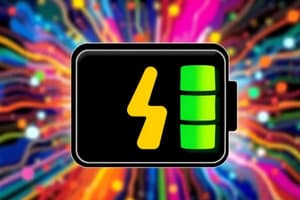Podcast
Questions and Answers
What is the formula for work (W)?
What is the formula for work (W)?
- W = F / s
- W = Fs^2
- W = F * s (correct)
- W = F + s
When is work considered positive?
When is work considered positive?
- When the force has a component in the same direction as the displacement (correct)
- When the force is zero
- When the force is perpendicular to the displacement
- When the force has a component opposite to the displacement
How is average power defined?
How is average power defined?
- Average power = Force * displacement
- Average power = Work done + time interval
- Average power = Total energy / time interval
- Average power = Total work done / time interval (correct)
How much work does the cable do on the car if it pulls horizontally for a distance of 5.00 km with a tension of 850 N?
How much work does the cable do on the car if it pulls horizontally for a distance of 5.00 km with a tension of 850 N?
What is the tension in the light string connecting the blocks with a combined weight of 32 N?
What is the tension in the light string connecting the blocks with a combined weight of 32 N?
How many joules of energy does a 100-watt light bulb use per hour?
How many joules of energy does a 100-watt light bulb use per hour?
How fast would a 70-kg person have to run to have the same amount of kinetic energy as a 100-watt light bulb uses per hour?
How fast would a 70-kg person have to run to have the same amount of kinetic energy as a 100-watt light bulb uses per hour?
Flashcards are hidden until you start studying
Study Notes
Work and Power
- Work (W) is defined as the product of a constant force (F) in the direction of straight-line displacement (s).
- Equation: ( W = Fs )
- One joule (J) is equivalent to one newton times one meter ( (1 J = 1 N \cdot m) ).
Types of Work
- Positive Work: Occurs when the force has a component in the same direction as the displacement.
- Negative Work: Happens when the force has a component opposite to the displacement.
- Zero Work: Occurs when the force is perpendicular to the displacement.
Power
- Average power is defined as the amount of work done divided by the time interval in which the work was performed.
Practice Problems Overview
- A tow truck example illustrates work done on a car by measuring force exerted and the displacement.
- Additional calculations include scenarios with angles: horizontal pulling vs. pulling at an angle (e.g., 35.0°).
- The impact of gravity on work done highlights gravitational forces on the car during displacement.
Problem Scenarios
- In a frictionless system, analyze tension and work done on interconnected blocks.
- Calculate total work done when one block descends, comparing system work to gravitational work on that block.
- Energy analysis of a light bulb: A 100-watt bulb's energy usage in joules per hour and its comparison to a person's kinetic energy running speed (for a 70-kg person).
Key Concepts
- Understanding the distinction between different types of work (positive, negative, zero) is crucial for problem-solving in physics contexts.
- Power calculations provide insights into how efficiently work is performed over time.
- Application of concepts through practice problems fosters comprehension of theoretical principles.
Studying That Suits You
Use AI to generate personalized quizzes and flashcards to suit your learning preferences.




